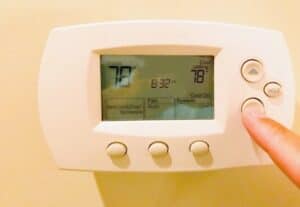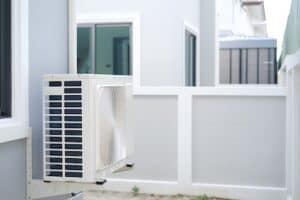Your Comfort, Our Priority
With expert technicians and a commitment to quality, Wolf delivers reliable heating and cooling solutions for every season. Experience the difference of service you can trust.
(918) 633-9077Is your AC blowing warm air when you desperately need cool relief? You’re not alone. Every summer, thousands of homeowners face the frustration of an air conditioner that just isn’t doing its job. The good news is that most causes are completely fixable — some even DIY-friendly.
In this comprehensive guide, we’ll cover 10 shocking but common reasons why your air conditioner might not be cooling your home. From clogged filters to faulty thermostats, we’ll explore each issue in depth, provide solutions, and help you decide when it’s time to call the pros.
Believe it or not, many AC problems begin with the thermostat. If your unit isn’t cooling as expected, double-check this little device first.
Common Thermostat Problems:
Incorrect settings: Ensure it’s set to “cool” and the temperature is below room temp.
Dead batteries: Low power can mess with operation.
Old or faulty thermostats: Malfunctions can send incorrect signals to your AC.
Quick Fixes:
Replace the batteries.
Clean around the thermostat with a dry cloth.
Upgrade to a programmable or smart thermostat for better control.
Thermostat issues are easy to overlook, but they’re often the easiest fix.

Your AC depends on good airflow to function properly. A clogged filter can choke that airflow, making your AC work harder and cool less.
Signs of a Dirty Air Filter:
Weak airflow from vents
Dust buildup on vents and registers
AC turning on and off frequently
What to Do:
Check your air filter monthly.
Replace it every 30 to 90 days, or more often if you have pets or allergies.
This simple habit can prevent major system breakdowns and save on energy costs.
Your outdoor unit needs to expel heat, but when the condenser coils are covered in dirt, they can’t do their job effectively.
Causes of Dirty Coils:
Outdoor debris like grass, leaves, or pollution
Lack of annual maintenance
Pet hair and dust accumulation
How to Clean:
Turn off the power.
Gently rinse with a garden hose (never a pressure washer).
Use a coil cleaner if needed.
Clean coils improve cooling and reduce strain on your system.
Refrigerant is like the blood of your AC system. Without enough of it, your system simply can’t cool.
Warning Signs:
Hissing or bubbling sounds
Ice buildup on refrigerant lines
AC blows warm air
Solution:
If you suspect a leak, call a licensed technician. Handling refrigerant requires EPA certification and specialized tools.
Important: Recharging refrigerant without fixing the leak is just a temporary patch.

Frozen coils might sound like a cooling win, but they actually block airflow and cause system failure.
What Causes Coil Freeze?
Dirty filters
Refrigerant issues
Poor airflow or fan problems
How to Unfreeze Them:
Turn the AC off.
Let the coils thaw for several hours.
Check and replace your air filter.
If freezing continues, call a pro to check for refrigerant or blower problems.
Your AC is a complex system of wires, switches, and capacitors. When any of these components fail, your unit might stop cooling or shut down altogether.
Common Electrical Issues:
Worn-out contactors or relays
Burned wires or loose connections
Faulty capacitors that won’t start the compressor or fans
Symptoms to Watch For:
AC doesn’t turn on at all
Intermittent power or random shut-offs
Clicking sounds during operation
Fixes:
Electrical problems should be handled by a certified HVAC technician. Annual tune-ups can catch these issues early before they become dangerous.
Installing a surge protector for your HVAC system can prevent damage during power spikes.
Ductwork is the highway that delivers cool air throughout your home. If it’s damaged or blocked, the cool air won’t reach you, even if your AC is working hard.
Duct Problems Include:
Disconnected or torn ducts in attics or crawl spaces
Crushed ductwork from home renovations
Mold, dust, or rodent infestations
Solutions:
Check for visible duct damage if accessible.
Hire a pro for a duct inspection and air balancing test.
Seal any gaps with mastic tape or professional-grade sealant.
Even a 20% air loss in ducts can reduce your AC’s efficiency significantly.
Your AC has two fans: one blows indoor air over the evaporator coils, and the other expels heat outdoors via the condenser coils. If either one fails, your system’s cooling power drops drastically.
Fan Issues May Include:
Worn-out fan motor bearings
Broken or loose fan blades
Capacitor failure affecting fan startup
What You Can Do:
Listen for squealing, grinding, or rattling noises.
Clear debris around the outdoor unit.
If fan blades aren’t spinning, shut off the unit and call a technician.
Replacing a fan motor early can prevent compressor failure, saving you thousands.
Size really does matter when it comes to AC. An incorrectly sized system—either too small or too large—will struggle to keep your home comfortable.
Problems With Oversized Units:
Short cycling (frequent starts and stops)
Higher humidity levels
Wasted energy
Problems With Undersized Units:
Constant running with minimal cooling
High utility bills
Increased wear and tear
Solution:
A proper Manual J Load Calculation from an HVAC professional will determine the correct size for your home. Don’t rely on square footage alone—consider insulation, ceiling height, and window size.
If your AC is over 10–15 years old, it might be nearing the end of its life. Older systems often lose efficiency and struggle to meet cooling demands, even when maintained.
Signs It’s Time to Replace:
Frequent breakdowns
High repair costs
SEER rating under 13 (outdated efficiency standards)
Upgrade Benefits:
Lower energy bills
More consistent cooling
Advanced features like variable-speed motors and smart thermostats
Check with your local utility provider or Energy Star for rebates and incentives.
Maintaining your AC isn’t just about avoiding breakdowns—it’s about saving money and maximizing comfort.
Simple Maintenance Tips:
Replace air filters every 1–3 months.
Keep the outdoor unit clear of debris and weeds.
Schedule annual professional inspections.
Use ceiling fans to support your cooling system.
Bonus Tips:
Install a programmable thermostat.
Use window coverings to block heat gain.
Seal windows and doors to prevent cool air from escaping.
Not every AC issue can—or should—be fixed at home. In some cases, trying to DIY a fix can make things worse or even be dangerous.
Call a Pro If:
Your AC unit trips the breaker often
You hear hissing or see ice on the unit
The thermostat reads correctly, but the air is still warm
You suspect refrigerant leaks
Investing in a diagnostic visit could save you hundreds in preventable repairs.
Energy Efficiency Tips While Fixing Your AC
While your unit’s being repaired, you don’t have to suffer in the heat or rack up your electric bill.
Stay Cool Efficiently:
It could be due to dirty air filters, refrigerant leaks, thermostat issues, or a frozen evaporator coil. Start with the simplest fix—check the filter and thermostat settings.
Turn off your thermostat, shut down the AC unit at the breaker, wait 5 minutes, then turn it back on. This can resolve some minor glitches.
You shouldn’t. Low refrigerant can lead to compressor damage and higher repair costs. Call a certified technician immediately.
A recommended setting is 78°F (25.5°C) when you’re home, and higher when you’re away to save energy.
If your unit is over 10 years old, uses R-22 refrigerant, or requires expensive repairs, replacement is usually more cost-effective in the long run.
Ideally, schedule a professional tune-up once a year, preferably in spring before peak cooling season.
Your AC not cooling doesn’t always mean disaster, but it does mean it’s time to investigate. Whether it’s a minor fix like a clogged filter or something more serious like a refrigerant leak, understanding the root causes puts you in control.
With expert technicians and a commitment to quality, Wolf delivers reliable heating and cooling solutions for every season. Experience the difference of service you can trust.
(918) 633-9077
Bryan was professional and very knowledgeable. He did his best to fix my 30 yr old unit b4 making the decision to replace it. Then he charged me a yearly maintenance fee for the day since we purchased a new A/C. On top of everything, Bryan came back at 10 pm to bring window units to make sure my home would be cool. Thank you Read More

Had a new system installed, and they did an outstanding job. Arrived in the time frame that they said they would and started removing the old system. It took about 9 hours, but they moved the outside unit like I had asked with no hesitation. Ran new copper tubing, drain line, and electric. Did a very clean job on the installation, as you can see Read More

Great company with awesome employees. A friend of mine recommended Wolf’s when my ancient AC went out. Staff are always punctual, respectful and knowledgeable. No one wants to buy a new heat and air system, but this company made the process as easy and painless as possible!

Dalton Yandell was very thorough on servicing our unit. Not only did he clean around the outside of the unit, he also evaluated the condition of the inside of the unit and also clean it very thoroughly. He left an application to obtain a rewards membership to service our unit twice a year. Was very impressed with his work ethic, he was very cordial and Read More

Highly recommend Wolf’s Heating & Air Conditioning! They went above and beyond to get us on their schedule. Sam and Marcus did a fantastic job figuring out the issue, ordering the parts and making sure we were up and running! They were polite, professional and thorough!
Our experienced technicians handle the hard work so you don’t have to. Whether it’s maintenance, repairs, or installation, Wolf Heating & Air is ready to help.
(918) 633-9077